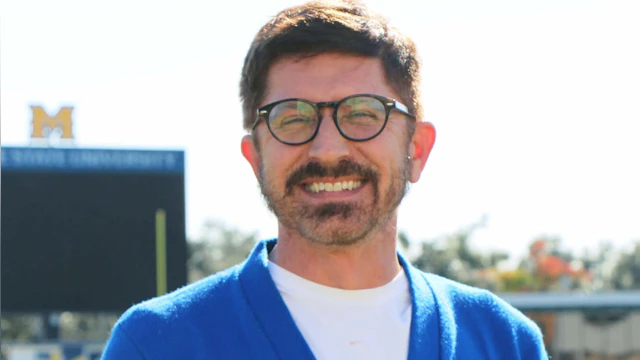
This Volunteer Spotlight story originally appeared in AFSP's 2023 Annual Report. To read other inspiring Volunteer Spotlight stories, and to learn more about our exciting work, click here.
Kevin Yaudes is a licensed professional counselor who teaches undergraduate psychology and graduate counseling at McNeese State University in Lake Charles, Louisiana. Recognizing a need for suicide prevention in his community through his work with a local high school, Kevin connected with AFSP’s Louisiana Chapter. Before he knew it, he was chairing the Southwest Louisiana Walk.
Since that time, Kevin has championed many aspects of the Louisiana Chapter, seeing the local Walk through the devastation of Hurricane Laura in 2020 and the pandemic, and taking the event’s fundraising efforts from $1,110 in 2020 to an astonishing $28k+ in 2022. In addition, Kevin has been instrumental in creating a partnership with the University of Louisiana System, the largest higher education system in the State of Louisiana, enabling the chapter to offer AFSP education trainings to students and faculty across the state.
“At McNeese State University, our master’s program in counseling has a community counseling clinic, with an established relationship with a local high school. In 2014, four students died at the school within a nine-month period, and at least two of the deaths were by suicide. The school created a program offering peer-to-peer support for students, and the community clinic at McNeese provided training to the peer educators and counseling for students.
I immediately encountered several students at imminent risk, and realized how great the need was for addressing suicidality, not just at the school, but in the community as a whole. I decided to create a suicide prevention program within the community clinic at McNeese. An educator at the high school referred me to AFSP. Discovering the chapter needed a Walk co-chair, I realized the Out of the Darkness Walk was perfectly in line with my goals. Shortly after, I joined the chapter’s board of directors, and in early 2023, became the board chair.
Through our local Walk, I saw the potential to create something impactful not just for loss survivors and those who have struggled, but for allies as well. I’ve always believed changing the culture around mental health requires the involvement of the whole community. People thinking about suicide often don’t feel comfortable sharing what they’re going through. I wanted to make our Walk a place where individuals could see the support that exists in our community. It’s also important to me to balance the gravity of the topic with hope – the hope that someone who is considering suicide might change their mind once they see the support available to them, and the hope that exists for loss survivors in healthily processing their experience and engaging with the community our local chapter provides. That hope is combined with persistence in engaging community members and businesses for their support, which grows each year. To our knowledge, our Walk is the largest annual mental health event in Southwest Louisiana!
I’m also proud to say that two years ago, I was selected as the Mental Health Content Expert for the University of Louisiana System (ULS). We created a Mental Health Advisory Council (MHAC), which I chair, consisting of two individuals from nine member universities. Our first initiative was to deliver no-cost AFSP suicide prevention education trainings to the 86,000+ people connected to ULS.
Both the Walk and the MHAC allow us to create a culture of care through a grassroots effort reaching thousands of people in our area. The more people who know the support that exists and the care exhibited by their community, the more people there are who feel comfortable getting help, and spreading their knowledge and compassion to others. That’s what the Walks — and AFSP — are all about.”